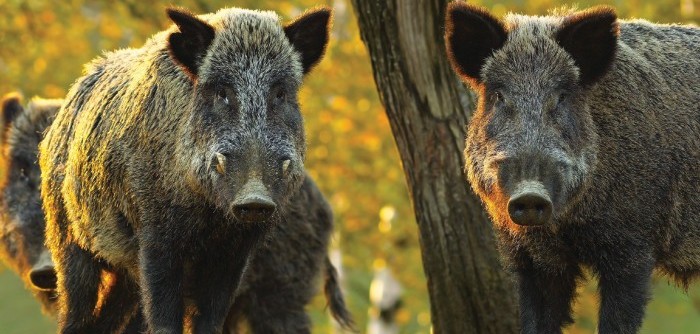The Government has raised its assessment of the risk of products contaminated with the African swine fever (ASF) entering the UK from ‘low’ to ‘medium’.
This follows a number of recent outbreaks in commercial herds in Romania and Poland and the discovery of ASF for the first time in Bulgaria. Consignments of pig meat from Romania, which has culled well over 180,000 pigs because of ASF in recent weeks, have entered the UK, the Animal and Plant Health Agency (APHA) said in its latest ASF update.
However, the risk of exposure of ASF to the UK pig population remains ‘low’, APHA said, stressing that the situation is being kept under constant review.
In total, there have been 744 confirmed cases of ASF in nine European countries in July and August, including 591 in Romania and 63 in Poland.
In Romania, 42 new outbreaks have been confirmed in several regions over the past week, including four in large commercial pig farms with over 140,000 culled pigs on affected premises. A further 40,000 pigs have been culled for preventative measures. Control points have been set up around the affected regions to increase biosecurity and enforce movement restrictions. It is reported that the farms were part of Romania’s largest pig breeding farm, owned by Romanian company TEBU Consult.
In Poland, there have been two outbreaks in the past week in domestic pigs, including one on a commercial farm of nearly 3,000 pigs, on the northern border with Russia near Kaliningrad.
Bulgaria reported its first outbreak in backyard pigs in Varna region on August 31, while cases have also been confirmed in July and August in the Czech Republic, Latvia, Lithuania, Moldova, Russia and Ukraine.
Romanian origin meat represents less than 0.5% of the total pig meat imported to the UK
from the EU, but that still represents several thousand tonnes per annum, APHA said.
“Fresh or frozen pig meat from any ASF-restricted zone cannot be consigned to other EU
member states, but commercially produced fresh or frozen pig meat derived from pigs
raised outside the restriction zones can continue to be traded,” APHA said.
The agency reported that some pig farmers in Romania believe ASF virus-contaminated
water may be a route of entry of infection into farms, describing this as a ‘credible risk route’.
According to the EU Trade Notification System, TRACES, there have been six consignments of frozen pig meat from Romania consigned to the UK in the last month, APHA said, adding that it was following up on the origin of the animals.
The risk of ASF introduction to the UK was previously raised to ‘low’ in August 2017. This
was because, despite the relatively low level of legal trade in live pigs or commercially
produced pig products, there could be a risk involving movement of people and vehicles from affected Eastern EU countries.
But in its latest update, APHA said: “We have reassessed the risk and consider that, on a temporary basis, given the increase in ASF outbreaks in commercial pigs in the last two weeks and the continued import of frozen pork meat from affected countries, the risk is increased to MEDIUM for the entry of contaminated or infected products into UK both over the last month and looking forward. This risk level will be reassessed every two weeks.
“The risk of exposure to the pig population in the UK is still dependent on the level of biosecurity on pig premises and is still considered to be “LOW”, although the situation is being kept under review.”
KEY MESSAGES TO PIG KEEPERS
- APHA is reminding all pig keepers and the public to ensure pigs are not fed catering waste, kitchen scraps or pork products, thereby observing the swill feeding ban.
- All pig keepers should be aware that visitors to their premises should not have had recent
contact with affected regions. - Anybody returning from the affected EU MSs should avoid contact with domestic pigs, whether commercial holdings or smallholdings, areas with feral pigs or wild boar, until they are confident they have no contaminated clothing, footwear or equipment.
- Although mortality in infected animals is almost 100%, the initial rate of ASF spread in a pig farm can be slow, therefore the possibility of ASF should be considered even for single pigs with haemorrhagic lesions, lethargy, skin discolouration or petechiation and high fever.
- Pigs suspected to be affected with African or classical swine fever must be reported immediately to APHA – please see https://www.gov.uk/guidance/african-swine-fever for more information.
- Pig keepers and veterinarians should remind themselves of the clinical signs for ASF and images and descriptions of clinical signs and pathology of ASF are provided on this link: https://www.flickr.com/photos/defragovuk/sets/72157694954571532/
- A campaign to highlight the dangers of swill feeding and more information can be found on
this link - . APHA is reminding the public that any feeding of meat products, including
the feeding of swill, kitchen scraps and catering waste, to wild boar or feral pigs is also
illegal. - A poster for pig keepers summarising actions they can take can be downloaded
here: http://apha.defra.gov.uk/documents/surveillance/diseases/african-swine-feverposter.pdf




